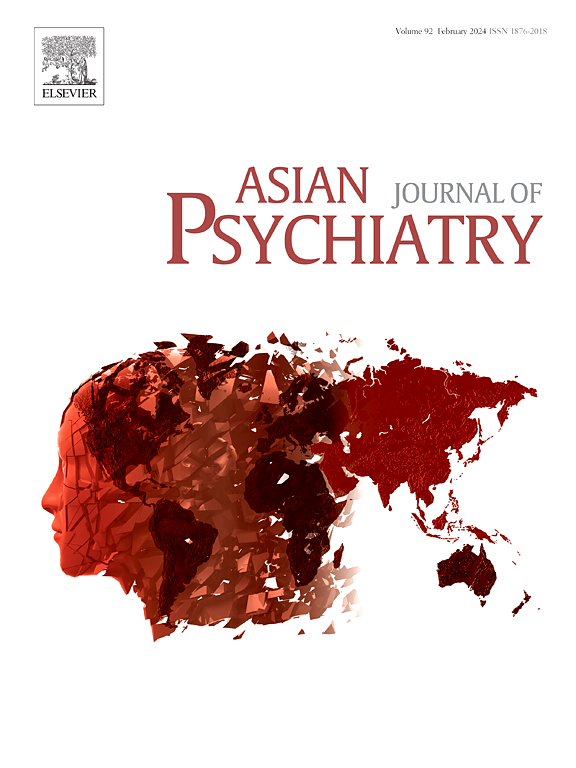Early diagnosis of mild cognitive impairment and Alzheimer’s disease using multimodal feature-based deep learning models in a Chinese elderly population
IF 4.5
4区 医学
Q1 PSYCHIATRY
引用次数: 0
Abstract
Background
Alzheimer’s disease (AD) and mild cognitive impairment (MCI) are progressive neurodegenerative disorders with no effective treatments currently, underscoring the urgent need for early diagnosis. Electroencephalography and event-related potentials (ERP) provide noninvasive, cost-effective methods with high temporal resolution for detecting cognitive decline, while traditional Chinese medicine (TCM) features such as body constitutions have been identified as risk factors for MCI. Recent developments in artificial intelligence (AI) especially deep learning architectures have further improved the diagnostic accuracies of AD and MCI. This study aimed to assess the efficacy of deep learning models based on fused ERP and TCM features in the cross-subject classification of cognitive impairment.
Methods
Visual oddball ERP tasks under Neutral, Happiness, or Sadness stimulus were conducted among 30 healthy controls (HC, 12 males and 18 females), 30 MCI (10 males and 20 females), and 30 AD (10 males and 20 females) patients. Deep learning models, including EEGNet, Convolutional Neural Network - Long Short-Term Memory, Graph Convolutional Network, (GCN), and multi-scale feature reconstruction GCN, were employed to extract differential entropy features from ERP data, and multilayer perceptron was utilized to extract features from TCM questionnaires. After feature fusion, 10-fold cross-subject binary (HC vs. MCI+AD; MCI vs. AD) and ternary (HC, MCI, AD) classification tasks were performed subsequently.
Results
GCN significantly outperformed other models in all three cross-subject classification tasks. In binary classification tasks distinguishing HC from MCI and AD, GCN achieved accuracies of 90.17 ± 5.58 %, 86.73 ± 2.34 %, and 84.73 ± 4.28 % under Neutral, Happiness, and Sadness, respectively. Similarly, in ternary classification of HC, MCI, and AD, GCN reached the highest accuracy of 72.67 ± 1.89 % under Neutral stimulus.
Conclusions
Leveraging fused ERP and TCM features, deep learning models have demonstrated robust cross-subject efficacy in the early diagnosis of cognitive decline. Particularly in distinguishing HC from MCI and AD, the performance of GCN was comparable to that of hematological biomarkers. Our study, therefore, highlights a reliable and effective AI-driven methodology for the early diagnosis of cognitive impairment in clinical settings.
基于多模态特征的深度学习模型在中国老年人群中轻度认知障碍和阿尔茨海默病的早期诊断
阿尔茨海默病(AD)和轻度认知障碍(MCI)是一种进行性神经退行性疾病,目前尚无有效的治疗方法,因此迫切需要早期诊断。脑电图和事件相关电位(ERP)为检测认知能力下降提供了无创、高成本效益、高时间分辨率的方法,而身体体质等传统中医特征已被确定为MCI的危险因素。人工智能(AI)尤其是深度学习架构的最新发展进一步提高了AD和MCI的诊断准确性。本研究旨在评估基于ERP和中医特征融合的深度学习模型在认知障碍跨学科分类中的效果。方法对30例健康对照(HC,男12名,女18名)、30例轻度认知障碍(MCI,男10名,女20名)和30例AD (AD,男10名,女20名)患者进行中性、快乐、悲伤刺激下的视觉古怪ERP任务。采用EEGNet、卷积神经网络-长短期记忆、图卷积网络(GCN)、多尺度特征重构GCN等深度学习模型从ERP数据中提取微分熵特征,利用多层感知器从中医问卷中提取特征。特征融合后,10倍交叉学科二进制(HC vs. MCI+AD;随后进行MCI与AD)和三元(HC、MCI、AD)分类任务。结果gcn在三个跨主题分类任务上均显著优于其他模型。在二进制区分HC和MCI和广告分类任务,政府通讯实现精度90.17 ±5.58 %, 86.73±2.34 %,和84.73 ±4.28 %在中性,幸福和悲伤。同样,在HC、MCI和AD的三元分类中,中性刺激下GCN的准确率最高,为72.67 ± 1.89 %。结论融合ERP和中医特点的深度学习模型在认知能力下降的早期诊断中具有较强的跨学科疗效。特别是在区分HC与MCI和AD方面,GCN的性能与血液学生物标志物相当。因此,我们的研究强调了一种可靠而有效的人工智能驱动的方法,可用于临床环境中认知障碍的早期诊断。
本文章由计算机程序翻译,如有差异,请以英文原文为准。
求助全文
约1分钟内获得全文
求助全文
来源期刊

Asian journal of psychiatry
Medicine-Psychiatry and Mental Health
CiteScore
12.70
自引率
5.30%
发文量
297
审稿时长
35 days
期刊介绍:
The Asian Journal of Psychiatry serves as a comprehensive resource for psychiatrists, mental health clinicians, neurologists, physicians, mental health students, and policymakers. Its goal is to facilitate the exchange of research findings and clinical practices between Asia and the global community. The journal focuses on psychiatric research relevant to Asia, covering preclinical, clinical, service system, and policy development topics. It also highlights the socio-cultural diversity of the region in relation to mental health.
 求助内容:
求助内容: 应助结果提醒方式:
应助结果提醒方式:


